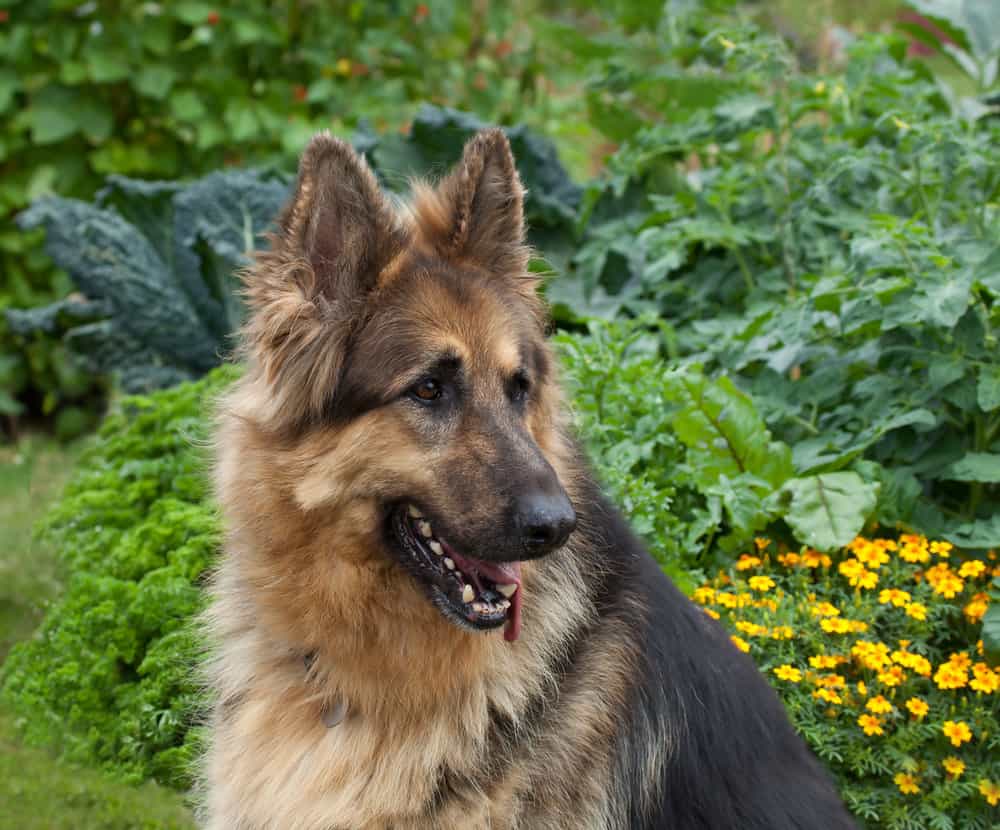A German Shepherd is no longer a puppy at two years old. Therefore, your German Shepherd will no longer gain significant weight, height, or size at that age.
Additionally, two years old is when your German Shepherd has changed all his puppy teeth and reached full sexual maturity.
Some minor growth variations happen between both genders throughout those two years. Additionally, male and female German Shepherds reach adulthood milestones at different times.
Helpful Dog Training Resource:
For help with training your dog, you should take a look at The Online Dog Trainer by Doggy Dan. Doggy Dan is an expert Dog Trainer based in New Zealand. His online resource contains Hundreds of Excellent Dog Training Videos that will take you step-by-step through the process of developing a healthy, happy well-behaved dog.
When Does a German Shepherd Mature?
For convenience, we’re going to divide maturity into three main categories:
- Mental Maturity
- Physical Maturity
- Sexual Maturity
Mental Maturity:

German Shepherds reach their full mental development at two years old. However, it doesn’t mean they remain puppies for the whole period.
It’s not like there’s a button they press at the two-year mark that suddenly makes them adult dogs. The process is a lot more gradual than that.
- Puppy Stage
At birth, German Shepherds have a lot of energy. Of course, they’re not mainly hunting dogs, but that doesn’t stop them from being extremely energetic and clumsy.
That’s a lot more notable during the puppy stage, which begins from birth until six months.
During this stage, your German Shepherd puppy would want to play all day and every day. He may be destructive and even aggressive if he doesn’t get enough interaction.
Yet, as your puppy gets closer to six months of age, things gradually calm down.
- Adolescence Stage
After six months, your German Shepherd puppy is now an adolescent dog. The extra energy stays, but the clumsiness reduces to a noticeable extent.
That’s when your German Shepherd picks more of the adult dog habits and stops being childish about everything.
Around that age or a little earlier is when you should start training your German Shepherd. Your dog's instincts at this age allow him to begin adapting to your training.
In this stage, your German Shepherd will start to understand basic commands like sit, eat, and stay.
- Adulthood Stage
Once your German Shepherd is two years old, you shouldn’t see any noticeable difference in his mentality afterward.
The dog is now mature enough to stop all the children's hassle he used to do. Instead, he’ll listen to your commands and follow your orders.
Physical Maturity:

Physical maturity is the only aspect of the German Shepherd's development that may stay for up to three years. Your German Shepherd might still get bigger after the second year, but it will be barely noticeable.
Because German Shepherds keep growing for almost two years after birth, new owners might be a little puzzled about that dog that seems never to stop growing.
Both genders will keep growing until they are two years old. However, remember that males and females will have slight weight and height differences as they grow up.
Males:
Around six months old, a male German Shepherd reaches around half his maximum weight. The average weight range is between 49 and 57 pounds at this stage. As for the height, your dog should be around 17 inches tall.
This should be the fastest growth stage your German Shepherd will experience.
Once your male German Shepherd ventures into adolescence, the growth rate begins to slow down gradually.
At 1 year old, your German Shepherd will weigh 71–79 pounds and be 23 inches tall. Once he reaches adulthood at 2 years, he may add 3 or 4 extra pounds to his weight.
A year later, your German Shepherd may add an additional 4 pounds and may or may not gain an extra inch of height. However, you will hardly notice any change between the second and third years.
Females:
Females of most species have slightly smaller physiques than males, and German Shepherds are no exception.
At 6 months, your female German Shepherd should weigh between 44–49 pounds. She should also have an average height of 16 inches.
When your female pup reaches the 1-year milestone, she’ll weigh between 60–64 pounds and have a height of 21 inches.
At 2 years, she may add a couple of pounds, but the height will mostly remain the same. However, she may gain an extra inch after the third year, which she often pairs with an additional 4 pounds of weight.
Helpful Dog Health Resource:
Note: Our Health is #1 Priority. It should be no different for your dog. But you need to help him. The Ultimate Guide to Dog Health is the answer. This handy guide will help you recognize the symptoms of the health problems above. Get the knowledge to stay ahead of these terrible issues that can rob your lovely dog from vigor and life. Help your friend make it to 14 yrs+ without pain and suffering.
Sexual Maturity:
The average age of dog sexual maturity is between 7–10 months. German Shepherd males lie well within this category as they reach sexual maturity between 6–9 months.
Female German Shepherds take a little longer, though. A female can reach her sexual maturity as soon as 12 months.
The heat of female German Shepherds starts between 6–12 months. However, in most cases, you shouldn’t worry about the female getting pregnant until she’s 2 years old.
Still, if you have a sexually active male in the house and don’t intend to breed, you should consider neutering.
If you want to avoid accidental pregnancy, your ideal neutering window is between 6–8 months.
When Does a German Shepherd Lose Puppy Teeth?

Much like any other puppy, German Shepherds begin their lives with nothing but those soft baby gums.
Soon after, at the three-week mark, to be specific, they start to get their first baby teeth.
After that, it doesn’t take the German Shepherd puppies long before they get all their baby teeth at 6 weeks.
Then, the puppies will lose their baby teeth when they’re 14 weeks old. After that, they will keep teething until 30 weeks (around 7 months.)
Remember that your puppies could be easily aggravated and uncomfortable during this period.
Teething isn’t a pleasant process for most species, and German Shepherds are no exception. As a result, they might start to chew on things you don’t want them to.
At this point, don’t yell at your puppies. That will scare them. Scared puppies will be harder to approach, train, and socialize.
Instead, invest in some dog toys that they can chew on to alleviate the pain and even help them change their teeth.

Paul has been creating content for the dog niche for many years. The information he shares comes his first hand experience growing up in dog lovers household and then owning multiple dog breeds of his own as an adult. Paul enjoys doing the hard research to collect, analyze and present our dogtemperament.com readers with the best answers to their questions.